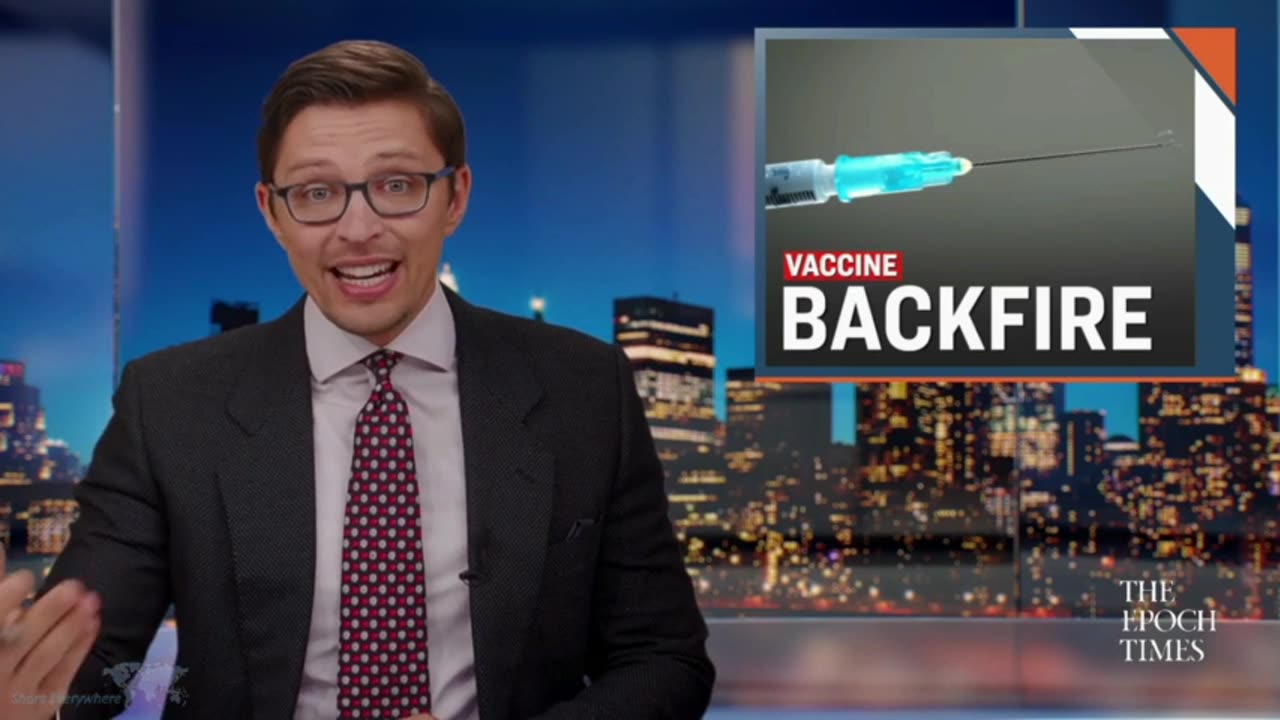Premium Only Content

Children Vaccinated Against COVID-19: Vaccine-Acquired Immune Deficiency Syndrome (VAIDS).
"🔥Study Found Unsettling Results in Children Vaccinated Against COVID-19": Vaccine-Acquired Immune Deficiency Syndrome (VAIDS)🔥.
Researchers from Australia took blood samples of 29 children before and after COVID-19 vaccination. They wanted to see if the vaccine might have other beneficial side effects.
Vaccines can trigger an immune response in your body that can help fight off additional viruses or bacteria—not just the one specific disease you were vaccinated against. Think of it as your body's defense mechanisms getting wiser. It’s called heterologous immunity, and it can happen with natural infections too.
The scientists noticed that nobody looked for this effect in COVID-19 vaccines for children.
But when they ran the experiment, what they found was exactly the opposite of what they expected (Paradoxical reaction).
Instead of seeing any improvement, they saw a reduced immune response toward other viruses, fungi, and bacteria. This was a big surprise for them.
But it was not surprising to the doctors who have been speaking out about mRNA vaccine safety. These doctors already have a name for this: vaccine-acquired immune deficiency syndrome, or VAIDS.
-------------------------------------------------------------------------
Very Bad News for Super-Vaccinated People: Study | Facts Matter - with ROMAN BALMAKOV
A new, recently published study found that the more COVID-19 shots a person received, the more weakened their immune system becomes. The researchers laid out within the study the mechanism by how this happens, which has to do with the spike in production of IgG4 anti-bodies within the vaccine recipient’s body.
A new body of research has recently discovered that these IgG4 anti-bodies are not benign, but can lead to a plethora of problems for the human body, including cancer, organ dysfunction, organ failure, and even death.
The technical name for this is IgG4-Related Disease".
- TheEpochTimes - Frontline Health - with Dan Skorbach.
-----------------------------------------------------------------------
According to the CDC, all COVID-19 vaccines currently available in the United States are effective at preventing COVID-19. Getting sick with COVID-19 can offer some protection from future illness, sometimes called “natural immunity,” but the level of protection people get from having COVID-19 may vary depending on how mild or severe their illness was, the time since their infection, and their age.
Getting a COVID-19 vaccination is also a safer way to build protection than getting sick with COVID-19. COVID-19 vaccination helps protect you by creating an antibody response without you having to experience sickness. Getting vaccinated yourself may also protect people around you, particularly people at increased risk for severe illness from COVID-19. Getting sick with COVID-19 can cause severe illness or death, and we can’t reliably predict who will have mild or severe illness. If you get sick, you can spread COVID-19 to others. You can also continue to have long-term health issues after COVID-19 infection.
While COVID-19 vaccines are effective, studies have shown some declines in vaccine effectiveness against infections over time, especially when the Delta variant was circulating widely.
The mRNA vaccines do not contain any live virus. Instead, they work by teaching our cells to make a harmless piece of a “spike protein,” which is found on the surface of the virus that causes COVID-19. After making the protein piece, cells display it on their surface. Our immune system then recognizes that it does not belong there and responds to get rid of it. When an immune response begins, antibodies are produced, creating the same response that happens in a natural infection.
In contrast to mRNA vaccines, many other vaccines use a piece of, or weakened version of, the germ that the vaccine protects against. This is how the measles and flu vaccines work. When a weakened or small part of the virus is introduced to your body, you make antibodies to help protect against future infection.
Everyone ages 18 and older should get a booster shot either 6 months after their initial Pfizer or Moderna series, or 2 months after their initial Johnson & Johnson’s Janssen vaccine. People ages 16–17 may get a booster dose of Pfizer at least 6 months after their initial series of vaccines.
The CDC says A person is fully vaccinated two weeks after receiving all recommended doses in the primary series of their COVID-19 vaccination. A person is up to date with their COVID-19 vaccination if they have received all recommended doses in the primary series and one booster when eligible.
Getting a second booster is not necessary to be considered up to date at this time. A study by The Cleveland Clinic found that both previous infection and vaccination provide substantial protection against COVID-19. Vaccination of previously infected individuals does not provide additional protection against COVID-19 for several months, but after that provides significant protection at least against symptomatic COVID-19.
According to the CDC layered prevention strategies — like staying up to date on vaccines and wearing masks — can help prevent severe illness and reduce the potential for strain on the healthcare system. Wear a mask with the best fit, protection, and comfort for you.
If you are in an area with a high COVID-19 Community Level and are ages 2 or older, wear a well-fitting mask indoors in public.
If you are sick and need to be around others, or are caring for someone who has COVID-19, wear a mask.
If you are at increased risk for severe illness, or live with or spend time with someone at higher risk, speak to your healthcare provider about wearing a mask at medium COVID-19 Community Levels" - The Hill.
-
 LIVE
LIVE
Producer Michael
2 hours ago$70K Oud Made from Wood! The World's Most Exclusive Fragrance
78 watching -
 35:47
35:47
Michael Franzese
1 hour agoHBO’s Sons of Ecstasy: The Harsh Truth About the Mob’s Impact on Family
24.8K4 -
 2:01:52
2:01:52
The Quartering
4 hours agoBenny Johnson Backlash, Unhinged NFL Fan Gets Instant Karma, Tiktok Bought By Elon & More!
61.9K61 -
 1:02:43
1:02:43
Chad Prather
2 hours agoPete Hegseth Hearing Happening NOW! WE MUST CONFIRM HIM!
16.4K26 -
 1:40:52
1:40:52
Russell Brand
4 hours agoCalifornia Burns! Who’s Really to Blame? – SF519
117K52 -
 1:27:57
1:27:57
The Officer Tatum
3 hours agoLIVE: Pete Hegseth DESTROYS Leftist at Confirmation Hearing! + MORE Officer Tatum Show EP 41
41.4K61 -
 1:58:28
1:58:28
The Charlie Kirk Show
4 hours agoThe Hegseth Confirmation Hearing | Larsen, Dr. Marshall, Halperin | 1.14.2025
150K97 -
 12:15
12:15
Reforge Gaming
5 hours agoPlayStation has a First Party Problem
37.5K2 -
 7:12
7:12
Rethinking the Dollar
5 hours agoIs the Catalyst For the Next Financial Crisis...Homeowners Insurance?
30K3 -
 2:02:13
2:02:13
LFA TV
21 hours agoHEGSETH HEARING LIVE! | LIVE FROM AMERICA 1.14.25 11am
92.1K33